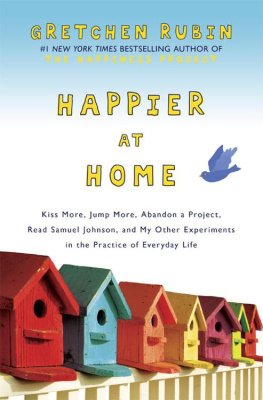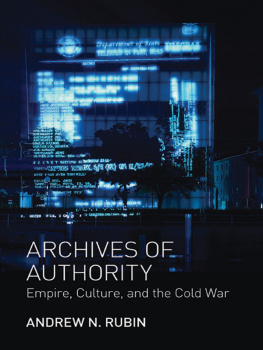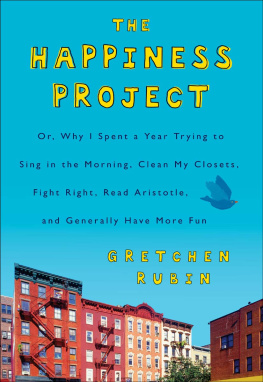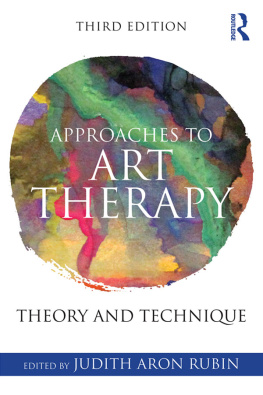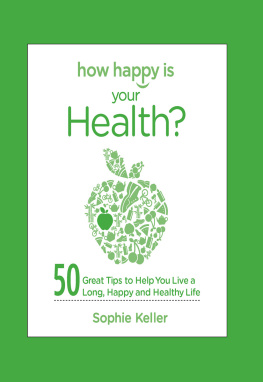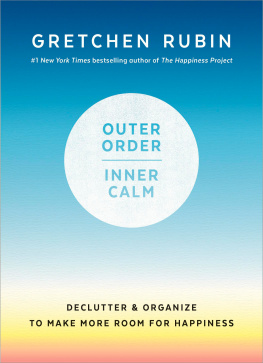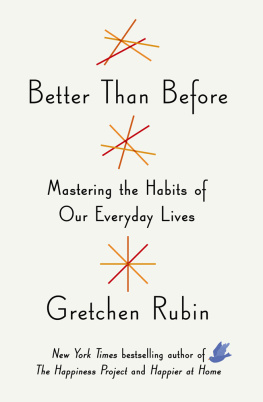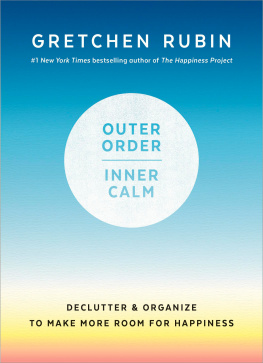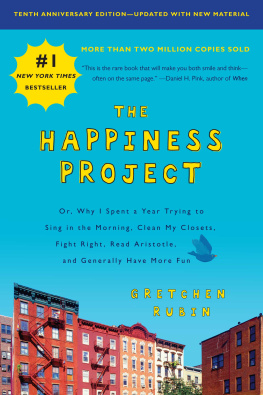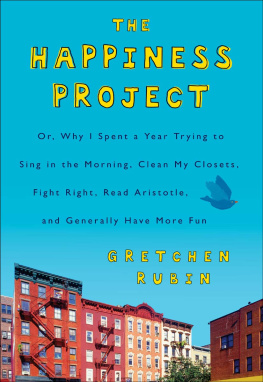Also by Gretchen Rubin The Happiness ProjectForty Ways to Look at JFKForty Ways to Look at Winston ChurchillPower Money Fame Sex: A Users GuideProfane Waste (with Dana Hoey)

Copyright 2012 by Gretchen Rubin
All rights reserved.
Published in the United States by Crown Archetype, an imprint of the Crown Publishing Group, a division of Random House, Inc., New York.
www.crownpublishing.com
CROWN ARCHETYPE with colophon is a trademark of Random House, Inc.
Library of Congress Cataloging-in-Publication Data
Rubin, Gretchen Craft.
Happier at home: kiss more, jump more, abandon a project, read Samuel Johnson, and my other experiments in the practice of everyday life / Gretchen Rubin.
p. cm.
1. Happiness. 2. Self-actualization (Psychology) 3. Life skills. I. Title.
BF575.H27R8298 2012
158dc23 2012001733
eISBN: 978-0-307-88680-4
Photographs courtesy of the author
Jacket design by Michael Nagin
Jacket photography Neonlight/Shutterstock
v3.1
For Elizabeth To be happy at home is the ultimate result of all ambition, the end to which every enterprise and labour tends. Samuel Johnson, The Rambler , No. 68
Safe, safe, safe, the heart of the house beats proudly. Long years he sighs. Again you found me. Here, she murmurs, sleeping; in the garden reading; laughing, rolling apples in the loft. Here we left our treasure Stooping, their light lifts the lids upon my eyes. Safe! safe! safe! the pulse of the house beats wildly. Waking, I cry Oh, is this your buried treasure? The light in the heart. Virginia Woolf, A Haunted House
CONTENTS
A NOTE TO THE READER
A happiness project is an approach to the practice of everyday life. First is the preparation stage, when you identify what brings you joy, satisfaction, and engagement, and also what brings you guilt, anger, boredom, and remorse. Second is the making of resolutions, when you identify the concrete actions that will boost your happiness. Then comes the interesting part: keeping your resolutions.
Happier at Home is the story of my second happiness projectwhat I tried, what I learned.
In the five years since my first happiness project, people have pressed, But did your project really make a difference? Your life didnt change much. How much happier can you be?
Its true, my life has remained the same: the same husband and two daughters, the same work, the same apartment, the same daily routine. Nevertheless, my happiness project really did heighten my happiness; when I made the changes I knew I ought to make, and followed my personal commandment to Be Gretchen, I was able to change my life without changing my life.
I cant start a happiness project, you might protest. I dont have any extra time, or extra money, or extra energy. I cant add one more item to my to-do list. But for the most part, my happiness project doesnt require much time, or much money, or even much energy. It takes work to be happier, but its gratifying work; the real challenge is to decide purposely what to doand then to do it.
Why, I often wonder, is it difficult to push myself to do the things that bring happiness? So often, I know what resolutions would make me happier, but still I have to prod myself to do them. Every day, I struggle to give a kiss, to get enough sleep, to stop checking my email, to give gold stars. Every day, I remind myself to accept myself, and expect more from myself.
My first happiness project was broad; Happier at Home is narrower, and deeper. Because I realized that of the many elements that influenced my happiness, my homein all its aspectswas most important, I decided to take some time to concentrate my efforts there. This is the account of the strategies I used to feel more at home, at home.
Of course, because this is my happiness project, it reflects my particular circumstances, values, interests, and temperament. Everyones idea of home, or happiness, is unique, but its the rare person who cant benefit from a happiness project.
Well, you might think, if everyones happiness project is unique, why should I bother to read about her project? My study of happiness taught me that, perhaps surprisingly, I tend to learn more from one persons highly idiosyncratic experiences than I do from sweeping philosophies or wide-ranging research. Its from the experience of a particular individual that I learn most about myself even if we two seem to have nothing in common. Some of my own best guides, it happens, continue to be an argumentative, procrastinating lexicographer, a nun who spent more than a third of her short life in a cloistered convent, and one of the signatories of the Declaration of Independence.
This book is the story of an education.
I hope that reading about my happiness project will encourage you to start your own. Whenever you read this, and wherever you are, you are in the right place to begin.

PREPARATION
The true secret of happiness lies in the taking a genuine interest in all the details of daily life .
William Morris, The Aims of Art
O ne late-summer Sunday evening, as I was unloading the dishwasher, I felt overwhelmed by a familiar but surprising emotion: I was hit by an intense wave of homesickness. Homesickwhy? Perhaps the hint of some scent, or the quality of the light, had triggered a long-forgotten memory. Homesickfor what? I didnt know. Yet even though I stood in my own kitchen, with my family in the next room, where Jamie watched golf on television while Eliza and Eleanor played Restaurant, suddenly I missed them terribly.
I looked around me, at the blue stove, the wooden knife rack, the broken toaster, the view from the window, all so familiar that usually I forgot to notice them.
May I offer you some dessert this evening? I could hear Eleanor asking in her best waitress voice. We have apple, blueberry, and pumpkin pie. I glanced into the next room, where I could see the tops of the girls heads; as usual, they were both wearing their straight brown hair in long, messy ponytails, and Eleanor sported a crooked waitress cap.
Blueberry, thank you, Eliza answered primly.
What about me? Jamie asked. Isnt the waitress going to take my order?
No, Daddy! Youre not in the game!
What was this yearning I felt? I was homesick, I realized, with a prospective nostalgia for now and here : when Jamie and I live with our two girls under our roof, with our own parents strong and busy, with two little nephews just learning to talk and play, everyone healthy despite a few longstanding, nagging medical concerns, and no disaster looming except the woes of sixth grade.
A line from the British literary giant Samuel Johnson floated through my mind. (My life differs in practically every way from that of Dr. Johnson, the eighteenth-century, dictionary-writing, eccentric genius, yet whenever I read Johnson, I understand myself better.) Johnson wrote: To be happy at home is the ultimate result of all ambition, the end to which every enterprise and labour tends.
Thats true, I reflected, pausing for a moment to think, before starting again, absentmindedly, to put away the dishes. Johnson was right; home was at the center of my lifefor good and for ill. But what was home, anyway? What did I want from my home?
Home is where I walk through the door without ringing the bell; where I take a handful of coins from the change bowl without asking; where I eat a tuna fish sandwich without misgivings about the ingredients; where I rifle through the mail. At the heart of this home is my family; where my family is, is home. If I lived by myself, home would be the place peopled with reminders of everyone I loved.
Next page
